经贸英语阅读教程Text 1(3)
经贸英语阅读教程Text 2(3)

Text 2 Q&A on a Sadly Predicable Debt Crisis
I. Related Words and Expressions capital expansion default on debt creditor intermediaries bankruptcy subprime mortgage risk capital monetary policy fiscal policy risk premium deflation liquidity balance sheet contract speculator down payment
II. Notes to the Text 1. securitized financial market 证券化的金 融市场 Securitization means the creation of financial instruments by combining other financial assets and then selling them to investors in the new form. Mortgages can be securitized, as can future royalties from a pop star's song portfolio. The new instruments can then be traded.
5. paternalist
家长主义者,家长作风的人 Someone in authority making decisions for other people which are often beneficial but which prevent those people from taking responsibility for their own lives.
2019经济学人考研英文文章阅读一三一

Alibaba sold$38.4bn of merchandise this Singles’Day这个双十一,阿里巴巴创造了384亿美元的销售额The world’s biggest online shopping frenzy这是一场全球最大的在线购物狂欢In1993A group of male students at Nanjing University in China decided to celebrate their singledom.The annual date would be November11th, comprised of four lonely1s.1993年,中国南京大学的一群男生决定选个日子庆祝他们的单身生活。
于是他们便定在了每年的11月11日,这一天是由四个孤独的“1”组成的。
The story may be apocryphal.But since2009Alibaba,China’s e-commerce giant,has turned Singles’Day into a very real shopping frenzy.It has long since eclipsed America’s Black Friday and Cyber Monday online sales combined.这个故事或许是虚构的。
但自2009年以来,中国电子商务巨头阿里巴巴就已经将光棍节打造成了一场真正的购物狂欢。
其销售额早已超过了美国的黑色星期五和网络星期一在线销售额的总和。
This year Taylor Swift performed at the countdown.In the next24hours Alibaba sold$38.4bn-worth of petitors like and Pinduoduo have piled in.泰勒·斯威夫特(霉霉)甚至都参加了今年的天猫双十一晚会。
经贸英语 chapter1
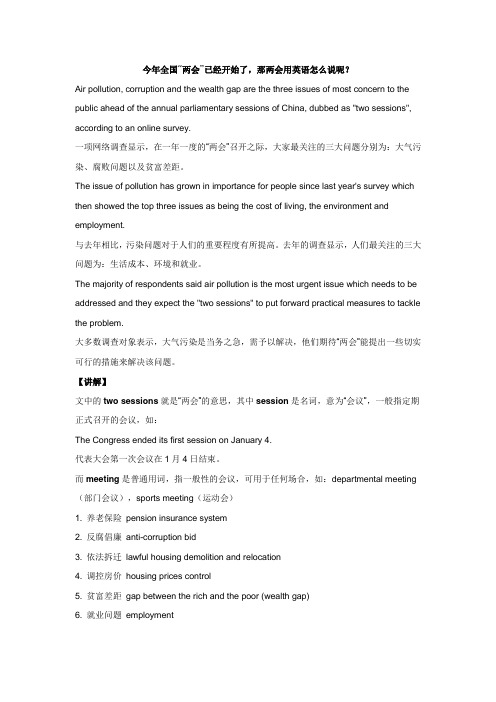
今年全国“两会”已经开始了,那两会用英语怎么说呢?Air pollution, corruption and the wealth gap are the three issues of most concern to the public ahead of the annual parliamentary sessions of China, dubbed as "two sessions", according to an online survey.一项网络调查显示,在一年一度的“两会”召开之际,大家最关注的三大问题分别为:大气污染、腐败问题以及贫富差距。
The issue of pollution has grown in importance for people since last year's survey which then showed the top three issues as being the cost of living, the environment and employment.与去年相比,污染问题对于人们的重要程度有所提高。
去年的调查显示,人们最关注的三大问题为:生活成本、环境和就业。
The majority of respondents said air pollution is the most urgent issue which needs to be addressed and they expect the "two sessions" to put forward practical measures to tackle the problem.大多数调查对象表示,大气污染是当务之急,需予以解决,他们期待“两会”能提出一些切实可行的措施来解决该问题。
【讲解】文中的two sessions就是“两会”的意思,其中session是名词,意为“会议”,一般指定期正式召开的会议,如:The Congress ended its first session on January 4.代表大会第一次会议在1月4日结束。
新编经贸英语阅读第一至第三单元答案及参考译文

第一至第三单元Keys to unit 1Text A1) Omit.2) Economics studies the choices made by people who are faced with scarcity.3) Scarcity is a situation in which resources are limited and can be used in different ways, so we must sacrifice one thing for another.4) The resources are limited, and they can be used in different ways.5) Omit.6) Because of scarcity, people must make difficult choices: You must decide how to spend your time; the city must decide how to use its land.7) Omit.8) Together, the choices made by individuals, firms, and governments determine society's choices9) 1. What goods and services do we produce?2. How do we produce these goods and services?3. Who consumes the goods and services that are produced?10) For example, if we devote more resources to medical care, we have fewer resources for education and consumer goods. If we increase the number of people working in factories, we have fewer people to work on farms and in the classroom. Ⅱ. Translate the followings:Part APartBPart C1) 人类有多种需要和需求。
经贸专业英语报刊阅读教程 第一课 Good policy, and bad
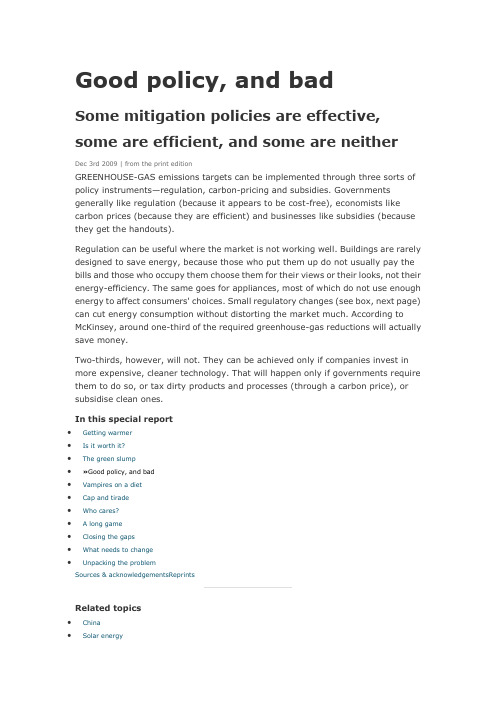
Good policy, and badSome mitigation policies are effective, some are efficient, and some are neitherDec 3rd 2009 | from the print editionGREENHOUSE-GAS emissions targets can be implemented through three sorts of policy instruments—regulation, carbon-pricing and subsidies. Governments generally like regulation (because it appears to be cost-free), economists like carbon prices (because they are efficient) and businesses like subsidies (because they get the handouts).Regulation can be useful where the market is not working well. Buildings are rarely designed to save energy, because those who put them up do not usually pay the bills and those who occupy them choose them for their views or their looks, not their energy-efficiency. The same goes for appliances, most of which do not use enough energy to affect consumers' choices. Small regulatory changes (see box, next page) can cut energy consumption without distorting the market much. According to McKinsey, around one-third of the required greenhouse-gas reductions will actually save money.Two-thirds, however, will not. They can be achieved only if companies invest in more expensive, cleaner technology. That will happen only if governments require them to do so, or tax dirty products and processes (through a carbon price), or subsidise clean ones.In this special report•Getting warmer•Is it worth it?•The green slump•»Good policy, and bad•Vampires on a diet•Cap and tirade•Who cares?• A long game•Closing the gaps•What needs to change•Unpacking the problemSources & acknowledgementsReprintsRelated topics•China•Solar energy•European Union•Alternative energy•EuropeCarbon pricing keeps government out of management decisions and allows managers to choose between different ways of cutting carbon. According to a paper by Carolyn Fischer, of Resources for the Future, and Richard Newell, head of America's Energy Information Administration, a carbon price is around twice as efficient as a renewable portfolio standard (which requires power companies to generate a certain proportion of the power they sell from renewable sources) and about two-and-a-half times as efficient as a renewable-energy subsidy.A carbon price can be set either by a tax or through a cap-and-trade system. Europe already has such a system and America, Australia and Japan are trying to set one up. Norway and Sweden have carbon taxes and France soon will (though none of them covers much of those countries' economies). The European Commission is also now looking at a tax. Both methods have advantages and drawbacks, but tax wins out for simplicity and stability.More important than the way the price is set, though, is its level. It needs to be high enough to send an unmistakable signal to business. According to Dimitri Zenghelis, one of the authors of the Stern Review and a senior adviser to Cisco and the Grantham Research Institute, a $40 carbon price now, doubling by 2050, and combined with non-price policies such as appliance standards and R&D support, is needed to hit the 450ppm target.The European Union's Emissions-Trading Scheme, which started up in 2005, is the only large-scale attempt so far to set a carbon price. Under the ETS, EU countries get national allocations which they then parcel out to over 11,500 factories in five dirty industries. Companies can buy and sell allocations amongst themselves, and can also buy “certified emission reductions” from developing countries to meet their caps through Kyoto's “clean development mechanism”.Europe's flagshipThe ETS makes up the vast bulk of the global carbon market, which will be worth around $122 billion this year. It is the principal way of financing the shift from high- to low-carbon power and industrial processes in the developing world. A wind farm in India; a methane-capture scheme for pig farms in Brazil; a forestry project in Indonesia; equipment to capture industrial gases in China—the ETS can finance them all.Although it is still young, the ETS has had some impact on emissions. According to a 2008 study at the Massachusetts Institute of Technology, in its first three years it probably reduced them by 120m-300m tonnes, or 2-5% a year, below what they would otherwise have been.Power companies and manufacturers factor a carbon price into their investment decisions these days. A t €15 ($22) a tonne the price is high enough to induce powercompanies to switch some generation from coal to gas at the margin, but not high enough to encourage much innovation.Blame politics. The price is determined by the cap, which is set by the European Commission in consultation with member states. Initially, member states overestimated their emissions in order to get lots of permits, so the carbon price was lower than the commission had expected. For the second phase of allocations, from 2008, member states fought vigorously to get more permits than their neighbours. Some sued the commission and, in September 2009, won. The price dipped again.Thanks to a combination of recession and lack of political will, most estimates of the future level of Europe's carbon price have been revised sharply downwards this year. And if America gets a carbon price, it is unlikely to be high enough to make much difference. According to America's Environmental Protection Agency, the legislation Congress is now considering would set it at $12 a tonne in 2012, rising to $20 in 2020. That, by itself, is unlikely to encourage much new investment, so if America is to make a dent in its emissions, it will have to rely mostly on subsidies.There is an argument for some of those. Basic R&D in new energy technologies—in carbon capture and storage, for instance, which would allow the continued use of coal to generate electricity—is too risky for most companies to undertake on their own, and offers enough social benefits to deserve government support. But the subsidies now on offer go far beyond that.Governments are spending heavily on encouraging the switch to low-carbon technologies, especially wind and solar power. “These policies are not particularly efficient, but they have been quite effective,” says Guy Turner, director of carbon markets at New Energy Finance. Some 50% of new power capacity added in the EU in 2000-06 was renewable energy, compared with 29% in 1990-2000.This sort of energy is expensive. The best indication of that is the carbon price that would be required to make investment in renewables worthwhile without subsidy. According to New Energy Finance, onshore wind energy needs a carbon price of $38, offshore of $136 and solar cells of $196. Europe's target for generating 20% of its energy from renewable sources therefore looks pricey. According to Richard Green, director of the Institute for Energy Research and Policy at Birmingham University, the implied marginal cost of carbon would be €129 a tonne—which suggests that allocating such large resources to renewable-energy subsidies is, as Mr Green says, “seriously sub-optimal”.The worst example of a wasteful subsidy is America's support programme for home-grown corn ethanol, which is coupled with tariffs on cheaper sugar-cane ethanol from Brazil. The programme has raised global food prices (and thus increased malnutrition among the world's poorest); lined the pockets of America's farmers; given policies to cut carbon a bad name; and cut little, if any, carbon.Solar flareEurope has yet to devise a policy quite so disastrous, but Spain's solar subsidy comes a close second. Its feed-in tariff for solar energy, established in 2007, offered generators 44 euro cents per kilowatt-hour. Coal-fired power costs around 4 cents per kwh to generate. The tariff was supposed to be for small-scale projects, of 100kw or less; but generators found that they could get it for larger ones if they installed banks of 100kw modules next to each other.The resulting boom benefited manufacturers not just in Spain but also in Germany and China, the biggest producers of solar cells. Last year Spain accounted for 40% of world demand. The government had planned for 400MW of solar capacity to be built by 2010. In the event, 3GW was built. Panicking about the commitments it was building up, the government announced that rates would drop to 32 cents on September 29th 2008. “There were all sorts of abuses,” says Jenny Chase, solar analyst at New Energy Finance. “If you connected a single module to the g rid before September 29th, your whole project got financed. So modules were changing hands for vast sums of money.” After the deadline the market collapsed.The Spanish crash hit silicon-wafer producers, the manufacturers of equipment for solar-cell producers and the makers of cells across the world. Prices across the industry crashed by 30-40%, and solar companies' share prices fell by 50-75% in 2008, though they have picked up a bit this year. Some 20,000 jobs have been lost in the solar industry in Spain over the past year, and plenty more elsewhere.Europe's energy subsidies, unlike America's, do not include nuclear, largely because of German opposition (which may change, following Angela Merkel's recent election victory). Nuclear power is more expensive than coal and gas, but probably cheaper than most renewables—though nobody is sure, since political opposition has ensured that few plants have been built in the West in recent years. Nuclear power does, however, have the virtue of scale. For renewables a gigawatt of power is a massive amount; for nuclear power it is the basic unit.Thanks to stimulus money to combat the recession, subsidies are now flooding into the renewable-energy business faster than ever before. Governments across the world have trumpeted their stimulus packages as a way of saving the world economy and the planet at the same time. Green stimulus money globally adds up to around $163 billion, according to New Energy Finance, of which more than $100 billion is being spent in America and China. The biggest chunk, around a quarter, is going on improving energy efficiency. Grid development is next, with a fifth.The green stimulus money has been slow in coming. In America it started to flow in the second half of this year, just as the economy began to recover. Some of it has been used to extend the tax credits for wind and solar energy and to convert some of the tax-credit schemes into grants. As a result, wind developers in America now get a cheque for 30% of the cost of the project once they connect to the grid. That scheme runs out at the end of next year.Mr Clover is concerned about the likely effect. “We're expecting a stampede in 2010. The danger is that you just bring forward demand. That's been a key feature of the US market. We've already seen several subsidy cycles—very high installations followed by complete cessations of activity. All anybody wants is long-term regulatory stability.” He hopes that will come with the imposition of a federal renewable portfolio standard on generators, which would require them to sell a certain proportion of renewable electricity as part of the mix.Globally, New Energy Finance reckons that only $24 billion of green-stimulus money will be disbursed this year, with another $58 billion to follow in 2010 and a further $56 billion in 2011. So it looks as though the money will come too late to temper the recession of 2008-09, and may instead fuel another inflationary boom in a couple of years' time.。
经贸英语阅读教程Text 5(3)
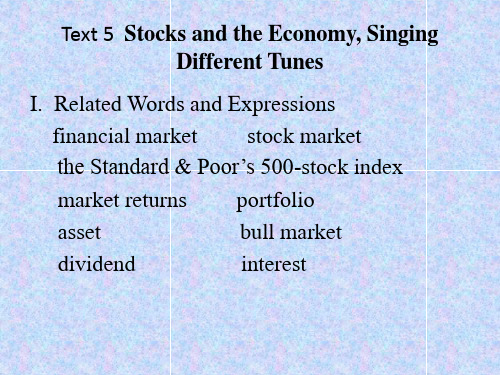
GDP per head (人均GDP),is a crude measure of the standard of living in a country. It is obtained by the ratio of that country’s GDP to its population. This measure is also known as the country’s income per capita or per capita GDP. In essence, it tells us how much each resident of a country would have if the value of a country’s production were equally divided among all members of society. By this standard, some countries are low or middle income (even though some residents may be rich) while other countries are high income (even though some residents may be poor).
an actual value. Moreover, the vast majority of derivatives 'cancel' each other out (i.e., a derivative 'bet' on an event occurring is offset by a comparable derivative 'bet' on the event not occurring). Many such relatively illiquid securities are valued as marked to model, rather than an actual market price. The stocks are listed and traded on stock exchanges which are entities of a corporation or mutual organization specialized in the business of bringing buyers and sellers of the organizations to a listing of stocks and securities together. The
经贸英语阅读教程Text 3(3)精编版
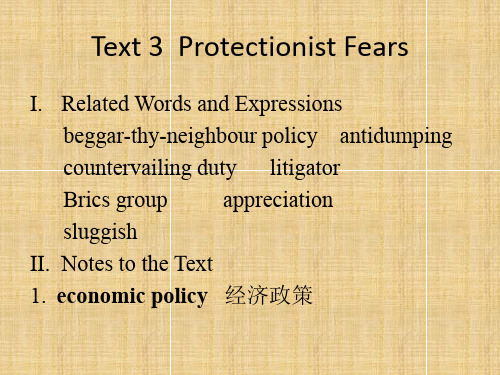
I. Related Words and Expressions beggar-thy-neighbour policy antidumping countervailing duty litigator Brics group appreciation sluggish
峰会召开以来,世界各国政府共实施了496项以邻为 壑的政策措施。
Buy-local campaigns, like putting up a tariff during a depression, are clearly a beggar-thy-neighbour policy. 购买国货运动,就像在经济萧条时期提高关税一样, 显然是一种以邻为壑的政策。
经济政策是国家或政府为了达到充分就业、 价格水平稳定、经济快速增长、国际收支平衡等 宏观经济政策的目标,为增进经济福利而制定的 解决经济问题的指导原则和措施。经济政策有宏 观经济政策和微观经济政策之分。宏观经济政策 包括财政政策、货币政策、收入政策等;微观经 济政策是指政府制定的一些反对干扰市场正常运 行的立法以及环保政策等。
“全球贸易预警”组织由总部位于英国伦敦 的经济政策研究中心发起,由世界银行、国际发 展研究中心等共同支持成立。该组织是一个专门 提供当前经济危机下各国采取贸易保护主义措施 信息的独立机构,其致力于总结并分析自2008年 11月匹兹堡峰会后各国采取的贸易保护主义措施。 至2012年5月,“全球贸易预警”组织共发布了11 份全球贸易保护主义警告报告。
6. beggar-thy-neighbour policy 以邻为壑政 策
In economics, a beggar-thy-neighbour policy is an economic policy through which one country attempts to remedy its economic problems by means that tend to worsen the economic problems of other countries.
经贸英语阅读
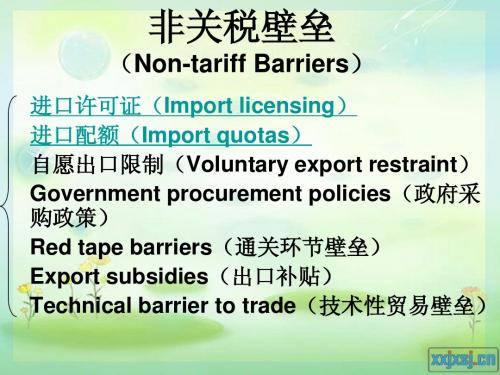
Thank you! you!
进口配额( 进口配额(Import quotas) )
• 一国政府在一定时间内,对于某些商品一定时期 一国政府在一定时间内, 内的进口数量或金额,事先加以规定的限额。 内的进口数量或金额,事先加以规定的限额。超 过规定限额的不准进口。 过规定限额的不准进口。 • 类型:绝对配额(absolute quotas) 类型:绝对配额( 关税配额( 关税配额(tariff-rate quotas) )
非自动许可 (non-automatic licensing) )
• 在对进口商品有数量限制或只有经过明确授权才 能允许进口时, 能允许进口时,通常会用到非自动许可 • 例:为了保护敏感产业和战略产业,马来西亚对 为了保护敏感产业和战略产业, 部分商品实施非自动进口许可管理,所有重型建 部分商品实施非自动进口许可管理, 筑设备进口须经国际贸易和工业部批准, 筑设备进口须经国际贸易和工业部批准,在马来 西亚当地企业无法生产的情况下方可进口。 西亚当地企业无法生产的情况下方可进口。 ——中国驻东盟国家使馆商务参赞谈双边合作 ——中国驻东盟国家使馆商务参赞谈双边合作
绝对配额( 绝对配额(absolute quotas)
• 绝对配额是将特定时期内进口商品的数量限制在 特定的水平。 特定的水平。
• 例1:墨西哥今年糖产量遭到干旱破坏,将导致其向美国 :墨西哥今年糖产量遭到干旱破坏, 的出口下降。因糖价高昂且供应存在不确定性,该国将考 的出口下降。因糖价高昂且供应存在不确定性, 虑在下一榨季发放额外的糖进口配额。 虑在下一榨季发放额外的糖进口配额。该进口配额将保证 下一榨季前三个月的消费量。 下一榨季前三个月的消费量。 • 例2: 2月21日,日本经济产业省公布了 : 月 日 日本经济产业省公布了2005年紫菜进口 年紫菜进口 配额方案,取消了对进口紫菜原产国的限制, 配额方案,取消了对进口紫菜原产国的限制,将进口紫菜 国别配额改为全球配额,进口紫菜配额总量为4亿张 亿张。 国别配额改为全球配额,进口紫菜配额总量为 亿张。这 标志着自2005年起,中国紫菜可以进入日本市场。 年起, 标志着自 年起 中国紫菜可以进入日本市场。
经贸英语文章选读Unit 1 Starting a Business
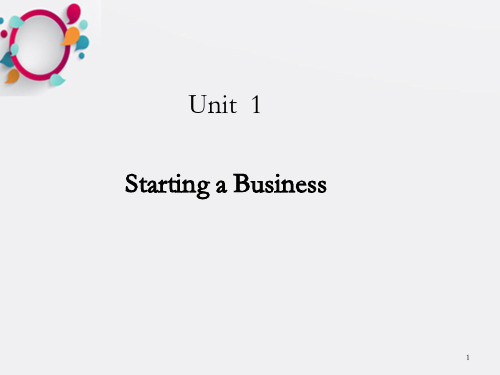
• crop up 突然出现 • Problems will crop up before you are ready.
在你还没有准备好时,各种问题就会突然出现 • all the rage 时尚;风行一时的事物 • Now that astrology has become all the rage, many newspaper,
Internet sites, radio programs, and TV talk shows include horoscopes. 现在星座成为时尚,许多报纸、网站、收音机 节目、电视脱口秀都包括了星座这个话题。 • franchise n. 特权;公民权;经销权;管辖权 vt. 给…以特许 (或特权) • Franchise transfer fee of $7500 to be paid by buyer includes franchise training fees. 买主需支付特许经营权转让费7500美 元,包括特许经营培训费。
• But before we get started, let's clear up one point:
6
• People always wonder if this is a good time to start their business idea. The fact is, there's really never a bad time to launch a business. It's obvious why it's smart to launch in strong economic times. People have money and are looking for ways to spend it. But launching in tough or uncertain economic times can be just as smart.
《英语经贸文章阅读教程》U1 PPT

Unit 1 The World Economy
1
热身练习
Warm-up questions:
a). What are the major features of the global economy this year? Describe the current status of the major world economic powers. b). Is the title of the text, “The Great Stabilization”, appropriate to describe the current world economic situation?
13
课文学习
Notes/Background information
Austria’s Hypo Group (para.5)奥地利裕宝集团 The Hypo Group Alpe Adria (HGAA) is an Austrian banking group with numerous cross-border activities in eight countries of the Alps-Adriatic region. Its network of branches and offices extends from Austria through Italy and Liechtenstein, from Slovenia through Croatia, BosniaHerzegovina, Serbia, Montenegro, Hungary and Germany on to Brussels. There are three strategic business sectors of the Hypo Group—banking, leasing and consulting. Hypo Group Alpe Adria aims to become the leading commercial bank in the Alps-Adriatic region. The bank was nationalised by the Austrian government to avert a bank collapse in 2009. 14
经贸英语阅读教程第三版课后答案
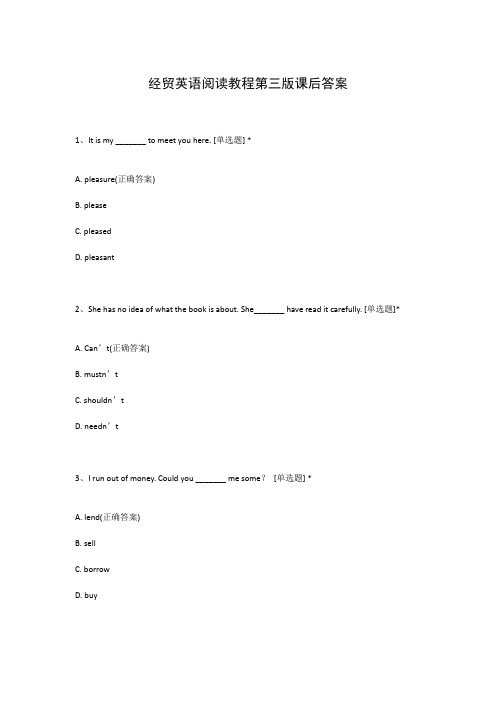
经贸英语阅读教程第三版课后答案1、It is my _______ to meet you here. [单选题] *A. pleasure(正确答案)B. pleaseC. pleasedD. pleasant2、She has no idea of what the book is about. She_______ have read it carefully. [单选题]*A. Can’t(正确答案)B. mustn’tC. shouldn’tD. needn’t3、I run out of money. Could you _______ me some?[单选题] *A. lend(正确答案)B. sellC. borrowD. buy4、He _______ getting up early. [单选题] *A. used toB. is used to(正确答案)C. is usedD. is used for5、7.—________ is the Shanghai Wild Animal Park?—It’s 15km east of the Bund. [单选题] *A.WhoB.WhatC.WhenD.Where (正确答案)6、82.—Is there a bookshop near here?—Yes. Walk ________ the road for five minutes and you'll see one near a big tree. [单选题] *A.toB.along(正确答案)C.ofD.about7、Could you tell me _____ to fly from Chicago to New York? [单选题] *A.it costs how muchB. how much does it costC. how much costs itD.how much it costs(正确答案)8、I'm sorry I cannot see you immediately. But if you wait, I'll see you_____. [单选题] *A. for a momentB. in a moment(正确答案)C. for the momentD. at the moment9、I often _______ music from the Internet. [单选题] *A. download(正确答案)B. spendC. saveD. read10、He couldn’t ______ the maths problem without your help. [单选题] *A. work out(正确答案)B. work atC. work forD. work with11、I live a very quiet and peaceful life. [单选题] *A. 宁静的(正确答案)B. 舒适的C. 和平的D. 浪漫的12、I like this house with a beautiful garden in front, but I don't have enough money to buy _____. [单选题] *A. it(正确答案)B. oneC. thisD. that13、33.Will Mary's mother ______ this afternoon? [单选题] *A.goes to see a filmB.go to the filmC.see a film(正确答案)D.goes to the film14、I usually do some ____ on Sundays. [单选题] *A. cleaningsB. cleaning(正确答案)C. cleansD. clean15、—Whose book is it? Is it yours?—No, ask John. Maybe it’s ______.()[单选题] *A. hersB. his(正确答案)C. he’sD. her16、16.We asked ______ engineer we met before to help repair the radio yesterday. [单选题] *A.aB.anC.the(正确答案)D./17、-We’ve spent too much money recently–well,it isn’t surprising. Our friend and relatives_______around all the time [单选题] *ingB. had comeC. were comingD have been coming(正确答案)18、She returns home every year to _______ the Spring Festival. [单选题] *A. celebrate(正确答案)B. shareC. watchD. congratulate19、61.How is online shopping changing our way? ? ? ? ? ? life? [单选题] *A.of(正确答案)B.inC.onD.for20、( )He killed the enemy guard and made away _________the villagers. [单选题] *A. with the helpB. with helpC. with help ofD. with the help of(正确答案)21、He has two sisters but I have not _____. [单选题] *A. noneB. someC. onesD. any(正确答案)22、37.It’s fun _________ a horse with your best friends on the grass. [单选题] *A.to ride (正确答案)B.ridingC.ridesD.ride23、Don’t _______ to close the door when you leave the classroom. [单选题] *A. missB. loseC. forget(正确答案)D. remember24、A survey of the opinions of students()that they admit several hours of sitting in front of thecomputer harmful to health. [单选题] *A. show;areB. shows ;is(正确答案)C.show;isD.shows ;are25、English is very important in our daily life. Never _______. [单选题] *A. give up itB. give it up(正确答案)C. give away itD. give it away26、I?have to?_______ my younger brother on Sunday. [单选题] *A. look after(正确答案)B. look upC. take careD. look out27、I repeated my question several times. [单选题] *A. 到达C. 重复(正确答案)D. 返回28、____ father is a worker. [单选题] *A.Mike's and Mary'sB. Mike and Mary's(正确答案)C. Mike's and MaryD. Mike and Marys'29、A healthy life is generally thought to be()with fresh air, clean water, and homegrown food. [单选题] *A. joinedB. boundC. lackingD. associated(正确答案)30、Tom is ____ honest man, so we all like to work with him. [单选题] *A. aB. an(正确答案)C. /。
经贸英语阅读教程Text 3(3)
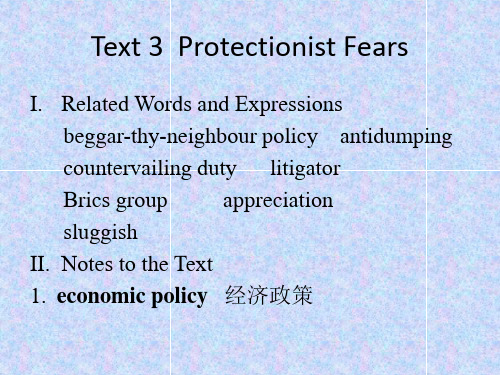
4. unemployment the number of people in a particular country or area who cannot get a job 失业;失业率;失业人数 unemployment可以构成如下相关短语: high/low unemployment rising/falling unemployment rise/increase/growth in unemployment fall/decrease in unemployment level of unemployment/unemployment level unemployment rate unemployment figures/statistics
《经贸英语阅读与翻译》
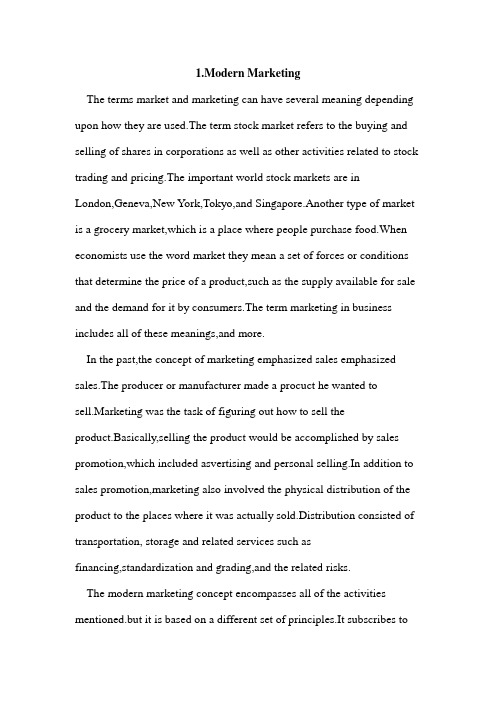
1.Modern MarketingThe terms market and marketing can have several meaning depending upon how they are used.The term stock market refers to the buying and selling of shares in corporations as well as other activities related to stock trading and pricing.The important world stock markets are in London,Geneva,New York,Tokyo,and Singapore.Another type of market is a grocery market,which is a place where people purchase food.When economists use the word market they mean a set of forces or conditions that determine the price of a product,such as the supply available for sale and the demand for it by consumers.The term marketing in business includes all of these meanings,and more.In the past,the concept of marketing emphasized sales emphasized sales.The producer or manufacturer made a procuct he wanted tosell.Marketing was the task of figuring out how to sell theproduct.Basically,selling the product would be accomplished by sales promotion,which included asvertising and personal selling.In addition to sales promotion,marketing also involved the physical distribution of the product to the places where it was actually sold.Distribution consisted of transportation, storage and related services such asfinancing,standardization and grading,and the related risks.The modern marketing concept encompasses all of the activities mentioned.but it is based on a different set of principles.It subscribes tothe notion that production can be economically justified only by consumption.In other words,goods should be produced only if they can be sold.Therefore,the producer should consider who is going to buy the product or what the marker for the product is -before production begins.This is very different from making a product and then thinking about how to sell it.Marketing now involves first deciding what the customer wants,and designing and producing a product that satisfies these wants at a profit to the company.Instead of concerntrating solely on production,the company must consider the desires of the consumer,and this is much moredifficult since it involves human behavior.Production on the other hand,is mostly an engineering problem.Thus,demand and market forces are still an important aspect of modern marketing,but they are considered prior to the production process.Because products are often marketed internationally,distribution has increased in importance.Goods must be at the place where the customer needs them and must brought there.This is known as place utility;it adds value to a product.However,many markets are separated from the place of production,which means that often both raw materials and finished products must be transported to the points where they are needed.Raw materials requiring little or no special treatment can be transported ba rail,ship,or barge at low rge quantities of rawmaterials travel as bulk freight,but finished products that often require special treatment,such as refregeration or carefull handling,are usually transported by truck.This merchandise freight is usually smaller in volume and requires quicker delivery.Merchandise freight is a term for the transportation of manufactured goods.Along all points of the distribution channel various amounts of storage are required.The time and manner of such storage depends upon the type of product.Inventories of this stored merchancise often need to be financed.Modern marketing is therefore a coordinated system of many business activities,but basically it involves four things:1)selling the correct product at the proper place,2)selling it at a price determined bydemand,3)satisfying a customer's needs and wants,and 4)producing a profit for the company.2.Bookkeeping and AccountingAll business enterprises,from the smallest to the largest,must keep finacial records.These records are c alled the company’s accounts.Oweners of small businesses such as stores,restaurants,or gasoline stations may handle all the accounts themselves.A large corporation,on the other hand,will probably have hundreds of employees and use computers to record its accounts.The records of a company's accounts are called its "books'.Each account is kept in a separate bookknown as a ledger.Every financial transaction must be posted in the books.There are two basic bookkeeping systems.In the single-entry system,expenditures and income are recorded to show a cash balance.Most of us are familiar with single-entry bookkeeping from our own bank or household accounts.Only one entry in the books is made for each transaction in this system.In double-entry bookkeeping,two entries are made for each transacrion.The books of accounts have two columns.The one on the left is called a debit,and the one on the right is called a credit.At one time,a debit showed an item with monetary value going out.The item of value could be cash,but it could also be merchandise and equipment.Today,however,most companies keep several different ledgers,so the same transaction may appear as a debit in one ledger and as a credit in another.When the two columns of each ledger are added,they should be equal.When they are not equal,a mistake has been made.In the modern business world,accounting plays an even more important role than bookkeeping.Bookkeepers simply record the financial transaction,though they must understand which items are credits and debits.Accountants,on the other hand,set up bookkeeping systems,check the records,and help management understand the figures.Many accountans are the expert of taxes,which have become more and morecomplicated over the years.The tax laws provide for many different kinds of deductions from taxable income.For example,there is an allowance for the depreciation of fixed assets,such as plant,machinery,and even office furniture."Depreciation" means that these items become less valuable as they wear out over a period of time.One job of a tax accountant is work out a depreciation schedule based on the average life of these items. When a new company is formed,an accountant sets up its bookkeeping system.The accountant must decide what books are necessary for the business.Then he or she must train the bookkeepers in the proper way to post the accounts.The process of checking the books is called an audit.Accountants is preparing financial statements annually.They show the financial condition of the company by listing its assets and liabilities are amounts that are owed or that have been lost.The accounting and bookkeeping department of a large corporation often has several sections.For example,one section will take care only of accounts payable-the money which the company owes.There may be still other sections to take care of taxes,pensions,and investments. Bookkeeping and accounting are central to modern business.Even when computers are used,the people who work with the accounts must be systematic,methodical and accurate.Many of the men and women who have risen to top management positions have had a background in bookkeeping and a background in bookkeeping and accounting.3.InsuranceEach of us constantly chances the possibility of finacial loss.Homes may be damaged or destroyed by fire strom and vandalism.Automotive accidents may result in loss of life,large of medical expenses,or damaged property.A wage earner may no longer be able to earn a living because of illness,injury,or old age.Death may result in unexpected expenses and loss of income for the rest of the family.Situation such as these in which you chance the possibility of financial loss are called economic risks.To avoid financial hardship,many people try to build financial security.They regularly put aside savings to pay for small finacial emergencies or to tide them over in case of temporary loss of income.Most people,however,are not able to build up enough savings to cover large or long-term losses.Therefore,they buy insurance as part of their financial security plan.Insurance is the protection against economic loss provided by sharing the risk with others.Insurance companies are business that provide insurance services.Because insurance companies are able to insure many people against a specific risk,the pool of people sharing the risk is large.And so the cost to each member of the pool is small.In addition,insurance companies base their costs on the theory of probability;that is ,an estimate of the likehood that a particular event will occur.On the basis of past experience,insurance companies can determinewiith reasonable accuracy how many accidents of a given type will likely occur within a certain period.The greater the chance,the greater the cost of that type of insurance.When a person insures something,there is always a written agreement or contract bettween the insurer and the insured.This agreement is called the insurance policy.The company selling the insurance is called the insurer.The insured,or policyholder,is the person on whose life or property an insurance policy is issued.An insurance policy is a legally binding contract.It is important,therefore,that you study it very carefully.You should be familiar with all the benifits as well as well as the restrictions that might affect you coverage.Many insurance policies have been standardized.But you will find there are differences,especially in health and car insurance.When you buy insurance,you make regular payments for the insurance protection you receive.The amout of money paid for insurance protection is called the premium.Several factors determine the amountof the premium.Two of these factors are the dollar amount (or dollar value) of the object to be insured and the likelihood of loss.For example,the owener of a $35000 home probably would pay more for home insurance than the owener of a $20000 home.This is because the dollar amount of the risk is higher.However,if the $20000 home were located in an area in which forest fires frequently occurred,the premium may be higher than for a$35000 home in a fire-safe area.This is because the chance of loss by fire is higher.Similarly,life insurance for a 60-year-old person would cost more than for an equal amount of insurance for a 15-year-old.This is because the 15-year-old can expect to live longer than 60-yearp-old. Insurance companies,like other businesses,have operating costs.Some of these costs are office expenses,and margin.Office expenses are the costs of running the insurance company.They include such things as salaries,office equipment,telephones,and office space.Selling expenses are commission and salaries paid to sales personnel.Margin is the amount of money above and beyond all expenses that is set aside to be used in case of unusual losses.These expenses also affect the cost of insurance. Shop carefully for any insurance you purchase.Although many insurance policies have standard coverage,the cost for the same protection may vary among comprties.You should compare the cost and the coverage.For example,if you want to insure a car,check the rates of several companies-don't just settle for the first one.Some types of insurance can be bought where you work.Most often,however,you will have to rely on the advice of an insurance agent. An insurance agent is a person who sells insurance.Some insurance agents may represent only one company or specialize in only one type of insurance.Other agents may represent several different companies of offer many kinds of insurance.Choosing a knowledgeable insurance agent is an important part of shopping for insurance.Most people do not know what types of insurance are available or what a specific insurance policy include.A good insurance agent can help you undestand the language of an insurance policy.And he or she can help you decide on the best kind of policy foryour needs.4.ContractsAs a consumer,you will take part in a great many business transactions throughout your lifetime.For the most part,these transactions will simply involve the buying of goods and ually,you will have little or nodifficulty in handling these transactions.Occasionally,however,things will not go as smoothly as you would like.Perhaps you may feel that you are being treated unfairly.Or you may want to be particularly sure that the terms of an agreement will be met.When this happens,a knowledge of the law that applies to business transactions or of where to seek advice may help you to solve your problems.A contract is a legally enforceable agreement between two or more parties.Many consumers think that contracts apply only to large purchases such as homes or cars where the buyer makes a written promise to pay over an extended period of time.But this is not true.Even the simplest purchases result in contracts.Ordinarily,any time you give someone money in payment for a good or service,you have entered into acontract.When you pay for a soft drink and a box of popcorn,you have made a contract.When you get into a taxi cab,and tell the driver where you want to go,you have made a contract.All these transactions,though simple everyday acts,involve contracts.From these examples,you can see that many contracts are implied contracts.Implied contracts are contracts in which the intent of the contracting parties is understood by their actions rather than stated in either spoken or written words.It is also clear that most contracts are oral.However,because implied and oral contracts are hard to prove,you should have all important contracts put in writing.A contract must have certain features in order for a court to uphold it as a valid contract.These features are 1)mutual assent,2)considerations,3)competent parties,and 4)legal purpose.If a contract is to be binding,there must be mutual assent.Mutual assent is agreement by the parties to all the terms of a contract.Mutual assent exists when there is an offer and complete acceptance of that offer.An offer must meet certain requirements to be legally binding.It must be definite,and it must show genuine intent to enter into an agreement.If a friend jokingly offers you a million dollars for a ride to school,it is obvious that there is no real intent.Similarly,an offer made in anger,fear,or stress is not usually one that is serious in intent.The party making the offer is the offeror.The party to whom the offer is made is the offeree.Acceptance takes place when the offeree agrees to the offer made by the offeror.The acceptance by the offeree must be without condition.That is ,the offeree cannot change the terms of the offer in any way.For example,suppose you offer to sell your bicycle to a friend for $25 and your friend say,"I'll buy it if you put refledtors.On first."This is not acceptable because your friend has made a condition.The acceptance must also be stated directly by the offeree to the offeror.If your friend tells someone else that he or she is planning to buy your bicycle,this is not an acceptance.Once the acceptance has been made to the offeror,the agreement is a contract,and both parties are bound by it. Another feature of a contract is that something must be promised,given,or done by each of the parties to bind the agreement.That someting is called condideration.Money,services,and goods most frequently serve as consideration in a contract.Promises may also be regarded as consideration.To be valid,promises must meet certain requirements.A promise cannot be a promise to do someting that one is already required by law to do.Also,a promise cannot be a promise to do something against the law.A third feature of a binding contract is that the parties who enter into it must have the ability to make a contract.Persons who have the ability to make a contract are called competent petent parties meansthose who are able to understand the contract and its consequences.In general,minors are not regarded as being competent parties. Sometimes business firms do make contracts with minors.This is risky because minors are sometimes able to refuse to carry out the terms of the contract.If the contract is for necessaries,a minor is liable for their reasonable value.Necessaries are those things that are needed for life and that are suitable to one's economic and social position.Food,clothing,shelter,medical care,basic education,and tools with which to earn a living are neccessaries by law.Goods for recreational use,such as motorcycles,sailboats,and stereo sets,are not necessaries.A merchant who makes a contract with a minor for such goods is taking a risk because the minor can refuse to pay for the goods.The minor cannot keep the goods,but sometimes there may be no goods to give back.Suppose a minor madea contract to buy a sailboat and the boat sank before it was paid for.If the minor refused to pay for the boat,there would be no goods to give back.Even if the merchant will have lost money.A forth feature of a binging contract is that it cannot in any way violate the law.The contract must be for a legal purpose.In addition,many contracts have been judged by the courts to be against the public good or to be harmful to health and morals of the general public.Examples of illegal contracts are those involving gambling,crime,or doing businesswithout a license is required by law.5.consumer DecisionsConsumer decisions can be divided into two main types:those that relate to spending for the necessities of life and those that relate to all other needs.Therefore,basic consumer decisions will be discussed first. All consumer decisions that involve the purchase of goods and services to satisfy the basic need for food,clothing,and shelter are called basic consumer decisions.For some people,particularly those with very low incomes,almost all spending may involve basic consumer decisions.The range of their choices may be limited.They may have to be concerned mainly with getting enough food to survive,enough clothing to keep warm,and enough housing to protect them against the elements.For the people,only a relatively small percentage of spending will involve basic consumer decisions.And their range of choices may be quite wide.Most people,however,fall somewhere between these two extremes.The major part-but not all-of their spending is related to basic consumer decisions.And their choices are fairly wide.For example,food is a basic need.But although you must eat everyday,your eating habits will have much to do with how much you spend on food.If you like eating in restaurants or only enjoy fine foods,your food bills will be high.If you are a thrifty shopper or prefer plain meals,your food bills will be low.Clothing is another basic need.However,the kind of clothing you wear often depends on your life-style.A person living in Hawaiii,for example,has different needs from a person living in North Dakota.Working people have different clothing needs from children or retired people.Even the type of work a person does affects that person's clothing needs.A bus driver who wears a uniform each day does not have the same needs as a salesclerk in a department store.Factory workers have different clothing needs from office workers.And individual perferences affect affect clothing bills.Some people will buy only high-cost fashionable clothing ,while others prefer low-cost utility cloting. Shelter,the third basic need,is usually the most costly expense.Most likely,you will spend more of your money on housing than no any other expense.Again,your individual life-style will determine how much you are willing to spend for this particular need.After you have made your basic consumer decisions.Discretionary consumer decisions are those decisions that involve the buying of goods and services from choice rather than from necessity.The money used in this type of spending is descretionary income-income left after meeting the expenses for all the necessities.Decision on how to use your descretionary income are made far more often than basic consumer decisions.These decisionso usually involve consumer wants,and they are concerned with pleasure,satisfaction andcomfort.You could use your discretionary income in any number of ways.It could be saved.It could be spent on travel,entertainment,or recreation.Or it could be spent on a car,a boat,or a hobby.Even more than basic consumer decisions,discretionary consumer decisions are determined by personal preferences and goals.Learning to manage your discretionary income is essential to effective consumer decision making.If you can make wise decisions,you will probably be able to satisfy the wantsatisfy that are most important to you.As you have learned,your basic needs affect your spending decisions.A number of other factorsS also influence consumer decision making.Chief among these factors are income,personal goals,social presures,habit,and advertising.More often than not,a combination of these factors,rather than just one, will determine how you send your money.Both basic and discretionary consumer decisions are largely dependent ofnumber the amout of disposable income a individual has.Disposable income is the amount of money left all deductions for taxes,insurance,social security,and other similar items have been made.Disposable income is the money available for spending.Disposable income is also called take-home pay.If you have no disposable income,your spending choices are clearly limited.The greater your income,the wider your spending choices.Generally,the larger the income you have,the smaller thepercentage of it that has to be spent on satisfying basic needs,and thus the larger the percentage of it that is available for discretionary spending.Therefore,an individual with little disposable income has very little discretionary income andiscretionary a small selection of goods and services from which to choose.Equally important,how much you have to spend often determines the kinds of goods and services you can buy.So,in addition to having a smaller selection to choose from,the individual with little disposable income may have only items of lower quality within that selection.The consumer decisions of most people are affected by other people in their social group. Social pressuresocial may exert great influence on clothing styles,hair stylesk,the type of housing,and the kind of recreation you choose.Sometimes,social presures can keep people from buying a particular product.A other timeshare they may cause people to purchase goods and services so that they can be "one of the gang".Consumer decisions are affected by habit.We do many things automatically,including much of our spending.Habit may cause you to do most of your shopping in just a few stores or to buy only certain brands of merchandise.You may have used one good or service for so long that it has almost become a part of your life.You may not be able to remember when or why the habit started.You may see no reason to change and may even not listen to suggestionsee for change.You are happy with yourpresent habit even though you may not know why.Advertising influernces consumer decisions.Advertising reaches us in many ways-through newspaper,magazines,radio and television.Advertsing circulars may be placed in your mailbox or left on your windshield of your car.You may find advertising on the pens and pencils you write with.You see it as you look through the classified section of the telephone directory.You see it in your school newspaper. Some advertisers urge us to go out and buy their products immediately.Other advertisers try to make a lasting impression on our minds so that when we need a product,a well-known product name comes to mind.Many advertising methods and techniques are used,but they all try to keep the name of a good or service in front of you,the consumer.When you go into a store to make a purchase,you may see some product that is familiar to you from a television ad.You identify the product with the ad.If you liked the ad,the chances are good that you will try the product.6.Business EthicsEthics is system of "oughts"-a collection of principles and conduct based on beliefs about what is right and wrong.Business ethics are ethics that apply to business behavior.Behavior that conforms to these principles is considered to be ethical business behavior.Otherwise,it is unethical. Firms often create a code of ethics.A code of ethics is formly arrangedcollection of rules to upgrade and guide behavior.It sets standards for dealing ethically with the firm's stakeholders.Such codes deal with issues like attempting to influence government regulatory officials,and using company property for personal use.The codes range from one-page general statements to lengthy booklets containing detailed guides and rules to ensure ethical behavior toward the firm's stakeholders.The underlying belief is that adherence to ethical standards is in the bestlong-run interest of the firm. But, in order to have any real meaning,the code must be communicated to employees,contain provisions for dealing with violations,and have soild backing by top management.When businesspeople are consistently unethical,society usually reacts by passing laws that prohibit the unethical behavior.For example,there are laws that make it illegal for firms based in the United States to pay bribes to high-ranking government officals in other countries in order to get business contracts with these governments.Every employee has his or her own code of ethicslSuch a code is based on the individual's personal value system.That individual's ethics are the standards against which he or she judges a particular action to be "right" or "wrong." Professional associations also have codes of ethics to which their members nust conform.Suppose a household products manufacturer plans to introduce a new oven cleaner on the market next week.Suppose further,however,that anemployee in the firm's new product development department discovers that the product is potentially harmful to users if they fail to follow precise the instructions printed on the package. This em[loyee feels a strong personal obligation to "do something" and believes the company's code of ethics requires corrective action.The employee discusses the problem with the head of the product development department but is told to "forget about it."What should the employee do in such a situaton?To do nothing might violate both personal and company ethical codes. On the other hand, bringing the matter to the attention of higher-ups in the firm would anger the employee's department head. Would higher-level manaement support the employee's action? If the employee is unsure of upper management support,should he or she call the Consumer Product Safety Commission in Washington, D.C. And tell them about the situation?The answers to these questions require serious delibration by the employee.His or her job would be "on the line"If the firm's ethical code is not genuine .Yet the employee cannot easily push the issue aside.One way for firms to deal with such a situation is to set up in-house proedures for reviewing employee claims about wrong-doing,without the need for the employee to make a formal accusation.As we have seen,an employee may get caught up in an ethical dilemma.Among the actions the employee might take are to keep quiet,toresign,or to"blow the whistle"on management.Whistleblowing is the action of publicly reporting what are perceived to be the wrongdoings of a business.A whistleblower is one who reports business practices that he or she believes to be wrong or harmful to consumers, employees,or any of the firm's other stakeholders.Whistleblowing may involve simply telling the news media.But it could also mean reporting to and working with government regulatory agences.Whistleblowing can lead to company reprials such as firings and demotions.Slowly but steadily,however,some states are beginning to protect whitleblowers. A handful of state laws ans a growing number of state court decisions are beginning to curb the longstanding practice some firms have of firing or discipling workers who expose illegal activities.Some states are also extending protection to those who report practices that,while not illlegal, do endanger public health or safety. Meanwhile,attorneys representing whistleblowers are questioning whether federal laws really protect private industry workers. Various nucler,environmental,health,and safety laws include provisions,that allow employees who are fired or disciplioned for reporting violations to seek redress through the U.S. Department of Labor.But the Labor Department procedure is slow, cumbersome, and uncertain.Thus, more andmore,government and private-industry,whistleblowers are turning to the courts.In court a whistleblower can obtain puntive damages rather than。
《经贸英语阅读教程》经贸英语,阅读.doc
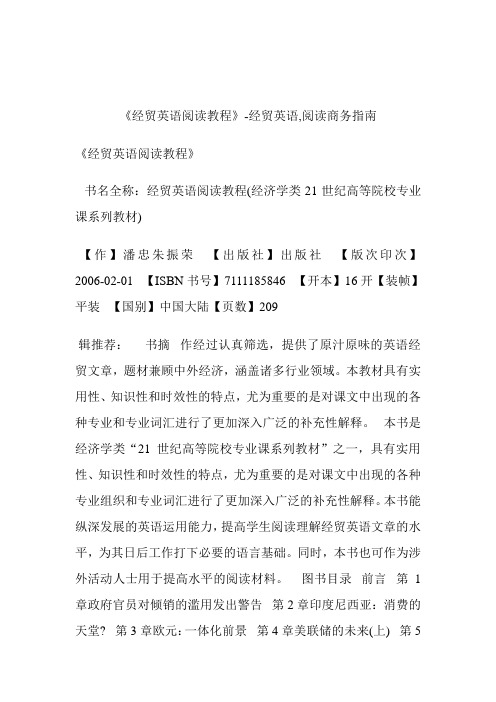
《经贸英语阅读教程》-经贸英语,阅读商务指南
《经贸英语阅读教程》
书名全称:经贸英语阅读教程(经济学类21世纪高等院校专业课系列教材)
【作】潘忠朱振荣【出版社】出版社【版次印次】2006-02-01 【ISBN书号】7111185846 【开本】16开【装帧】平装【国别】中国大陆【页数】209
辑推荐:书摘作经过认真筛选,提供了原汁原味的英语经贸文章,题材兼顾中外经济,涵盖诸多行业领域。
本教材具有实用性、知识性和时效性的特点,尤为重要的是对课文中出现的各种专业和专业词汇进行了更加深入广泛的补充性解释。
本书是经济学类“21世纪高等院校专业课系列教材”之一,具有实用性、知识性和时效性的特点,尤为重要的是对课文中出现的各种专业组织和专业词汇进行了更加深入广泛的补充性解释。
本书能纵深发展的英语运用能力,提高学生阅读理解经贸英语文章的水平,为其日后工作打下必要的语言基础。
同时,本书也可作为涉外活动人士用于提高水平的阅读材料。
图书目录前言第1章政府官员对倾销的滥用发出警告第2章印度尼西亚:消费的天堂? 第3章欧元:一体化前景第4章美联储的未来(上) 第5
章美联储的未来(下) 第6章与可持续发展:多哈发展议程第7章中国开始开展自由贸易...[浏览全部内容]。
经贸英语报刊阅读习题答案
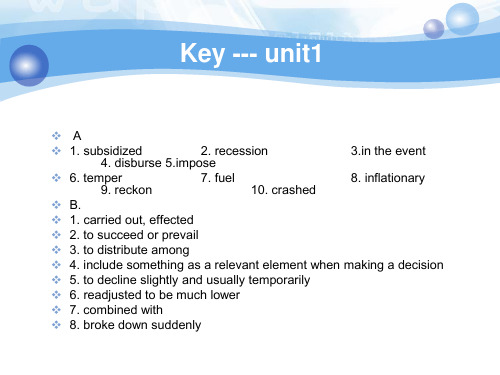
C. 1. 欧元区2013年GDP增长率预计不足0.5%。德国和法国几乎没有任何起色。 希腊将连续第六年陷入衰退;西班牙和葡萄牙面临五年内第四次经济下滑。 2. 领导们面临一个令人不快的选择:要么让欧元区解体,这会让该地区面临 陷入衰退的风险;要么进一步加深合作,这将迫使德国等核心国家为其他成 员国的问题买单。 3. 这意味着欧元区最终将会解体。其实不然:尽管早已伤痕累累,但欧元区 的医药箱里还有充足的膏药,帮助其顺利度过2013年。 4. 尽管欧洲央行将进行干预,以压低主权债券过高的收益率,帮助政府赢得 一点时间,但政客们还是不能修复根本问题。 5. 但这会导致财政政策的紧缩,最终,美国经济增长的重任就落在了美联储 的肩上。 6. 即便如此,对于想要找出中国经济增长瑕疵人来说,问题还是显而易见的。 可以重点关注利润压榨、投资浪费和产能过剩等。 7. 风险投资者不要拘泥于传统市场,尝试放眼更为另类的地方。 8. 没有了那个支持,中国的路途可能不会太平坦,而这正是新一届领导班子 极力避免出现的情况。 9. 你或许认为,金融危机爆发六年后,衰退早已远离我们,经济发展势头良 好。 10. 相反,世界上大片土地似乎开始像日本那样,陷入长期滞涨的困境。
6. 德· 古赫特先生也难以得到欧盟成员国对其调查的全力支持,因为 这些成员国正深陷经济危机之中,担心此举将恶化他们与中国的贸易 关系。 7. 尼兹切克先生指出,要完全收回生产和销售成本,中国光伏产品的 价格应该至少在每瓦特0.7欧元。 8. 这个协议在获得欧盟委员会26位委员的批准之前,将先提交给欧盟 成员国进行投票。 9. 沈先生指出,欧洲是中国光伏产品最大的出口市场,这个协议完全 符合双方的共同利益。 10. 我们有信心,这个价格上的举措将稳定欧洲光伏市场,并且消除 倾销行为对于欧洲光伏产业已经产生的影响。
经贸英语阅读
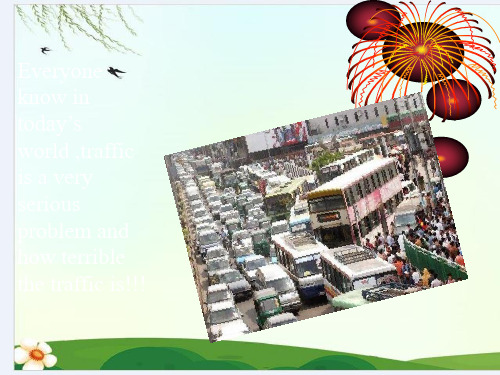
Meanwhile,it also reflects the environmental protection and low carbon problem 4、traffic management deficiencies(交通管理工作的不足) 2、advocate low carbon travel:walking or riding a bicycle 1、taxes levied on the sales of private cars should be raised
Everyone know in today’s world ,traffic is a very serious problem and how terrible the traffic is!!!
Some reasons from guangzhou poll that citizens analyse traffic jams are as follows:
In the picture,the car a bus after bus to plugging in the street ,various whining continuously. 3、advocate rational choice city:the negtive effects that are brought by the person all crowded in big cities 1、taxes levied on the sales of private cars should be raised 2、the business lines are not designed reasonably which causes blocking in the hot traffic way
- 1、下载文档前请自行甄别文档内容的完整性,平台不提供额外的编辑、内容补充、找答案等附加服务。
- 2、"仅部分预览"的文档,不可在线预览部分如存在完整性等问题,可反馈申请退款(可完整预览的文档不适用该条件!)。
- 3、如文档侵犯您的权益,请联系客服反馈,我们会尽快为您处理(人工客服工作时间:9:00-18:30)。
4. trade barrier 贸易壁垒 A general term that describes any government policy or regulation that restricts international trade. The barriers can take many forms, including import duties, import licenses, export licenses, import quotas, tariffs, subsidies, non-tariff barriers to trade. 5. farm subsidy 农产品补贴 A government subsidy paid to farmers and agribusinesses to supplement their income, manage the supply of agricultural commodities,
Hale Waihona Puke 3. the Doha round 多哈回合谈判
The world Trade Organization (WTO) conducts negotiations through what is called rounds. The Doha Development Round is the current trade-negotiation round which commenced with a ministerial-level meeting at Doha, Qatar in November 2001. The Doha Round’s objective is to lower trade barriers around the world, permitting free trade between countries of varying prosperity.
and influence the cost and supply of such commodities.
6. net importer 净进口国 A country or territory whose value of imported goods is higher than its value of exported goods over a given period of time. A net importer is the opposite of a net exporter.
7. Several studies show this income effect can outweigh the initial price effect. (1) income effect 收入效应 It describes the effects of changes in prices on consumption. According to the income effect, an increase in price causes a buyer to feel poorer, lowering the quantity demanded, and vice versa. Although the buyer's actual income hasn't changed, the change in price makes the buyer feel as if it has.
2. subsidy 补贴 A subsidy refers to direct or indirect government payment or special privilege industries.
In the countries where protectionism continues as a part of national economic policies, subsidy is viewed as a means to promote national self-sufficiency, to encourage emerging industries and to alleviate depression and unemployment. Subsidies are granted on the ground that preservation or expansion of these industries, even at the cost of the general public, is in the public interest.
Therefore,the income effect is the phenomenon observed through changes in purchasing power. It shows the real income of a consumer. (2) price effect 价格效应 Every price change can be decomposed into an income effect and a substitution effect; the price effect is the sum of substitution and income effects.
经贸英语阅读教程
Selected English Readings on Economics & Trade 潘 忠 王 茜 主 编
Text 1 The Doha Dilemma
I. Related Words and Phrases market distortion trade barrier unilateral primary farm products processed goods staple goods II. Notes to the Text 1. market distortion 市场扭曲
An economic scenario that occurs when there is an intervention in a given market by a governing body. The intervention may take the form of price ceilings, price floors or tax subsidies. Market distortions create market failures, which is not an economically ideal situation.
